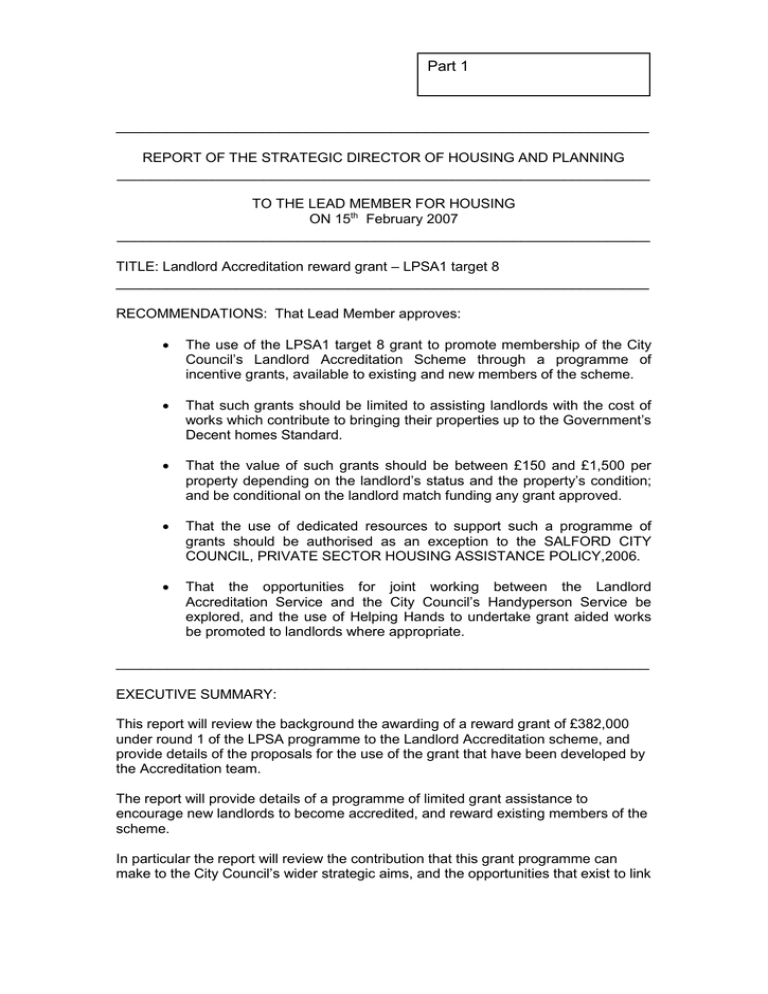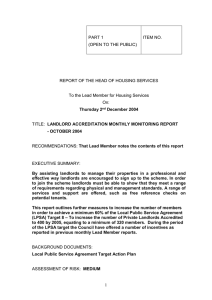Part 1 ______________________________________________________________
advertisement

Part 1 ______________________________________________________________ REPORT OF THE STRATEGIC DIRECTOR OF HOUSING AND PLANNING ______________________________________________________________ TO THE LEAD MEMBER FOR HOUSING ON 15th February 2007 ______________________________________________________________ TITLE: Landlord Accreditation reward grant – LPSA1 target 8 ______________________________________________________________ RECOMMENDATIONS: That Lead Member approves: The use of the LPSA1 target 8 grant to promote membership of the City Council’s Landlord Accreditation Scheme through a programme of incentive grants, available to existing and new members of the scheme. That such grants should be limited to assisting landlords with the cost of works which contribute to bringing their properties up to the Government’s Decent homes Standard. That the value of such grants should be between £150 and £1,500 per property depending on the landlord’s status and the property’s condition; and be conditional on the landlord match funding any grant approved. That the use of dedicated resources to support such a programme of grants should be authorised as an exception to the SALFORD CITY COUNCIL, PRIVATE SECTOR HOUSING ASSISTANCE POLICY,2006. That the opportunities for joint working between the Landlord Accreditation Service and the City Council’s Handyperson Service be explored, and the use of Helping Hands to undertake grant aided works be promoted to landlords where appropriate. ______________________________________________________________ EXECUTIVE SUMMARY: This report will review the background the awarding of a reward grant of £382,000 under round 1 of the LPSA programme to the Landlord Accreditation scheme, and provide details of the proposals for the use of the grant that have been developed by the Accreditation team. The report will provide details of a programme of limited grant assistance to encourage new landlords to become accredited, and reward existing members of the scheme. In particular the report will review the contribution that this grant programme can make to the City Council’s wider strategic aims, and the opportunities that exist to link the delivery of this programme with other initiatives in order to achieve added value and maximise the positive impact of the investment. Finally, the report will outline the arrangements that will be put in place to monitor the delivery of the programme and seek the approval of the Lead Member for the proposed course of action. ______________________________________________________________ BACKGROUND DOCUMENTS: Landlord Accreditation Code of standards Housing Act 2004 A Decent Home: definition and guidance for implementation SALFORD CITY COUNCIL, PRIVATE SECTOR HOUSING ASSISTANCE POLICY, 2006 _____________________________________________________________ ASSESSMENT OF RISK: The risk is perceived as being Low. The main risk to the success of the proposed scheme is a lack of take-up by landlords. This is unlikely as the scheme has been developed in close consultation with accredited landlords. Additionally, an active advertising campaign will be undertaken to promote the scheme to potential new members. ______________________________________________________________ SOURCE OF FUNDING: LPSA 1 target 8 reward grant ______________________________________________________________ LEGAL IMPLICATIONS: Report sent to Tony Hatton. No legal implications have been identified. ______________________________________________________________ FINANCIAL IMPLICATIONS: Nigel Dickens - Spend will be resourced from ringfenced capital funds and has been built in to the capital programmes for 2006-07 and 2007-08. COMMUNICATION IMPLICATIONS: The City Council’s Marketing and Communications Division will be commissioned to produce a leaflet to promote the scheme, and letters will be sent to accredited landlords to inform them of the reward grant. VALUE FOR MONEY IMPLICATIONS: The promotion of the Landlord Accreditation scheme as proposed will assist in the delivery of a range of strategic goals and add value to a number of existing projects:o Increasing the number of accredited landlords will facilitate the introduction of mandatory and selective licensing o Linking the availability of grant assistance to the decent homes standard will contribute to meeting the Council’s obligations under PSA7 and, in some cases, result in energy efficiency improvements in line with Salford’s Affordable Warmth Strategy. o Promoting the use of Helping Hands to deliver improvements to properties will support the City Council’s handyperson scheme and facilitate the referral of any vulnerable tenants to other relevant services o Effective and appropriate information management and sharing will ensure that properties which host Supporting People service will be identified, and any conditions which may be a cause of concern brought to the attention of relevant colleagues. CLIENT IMPLICATIONS: N/A PROPERTY: N/A ______________________________________________________________ HUMAN RESOURCES: No additional staff required. Associated workload will be allocated to officers within existing and future work plans. ______________________________________________________________ CONTACT OFFICER: Caren Kihal – Principal Officer, Housing Market Support ______________________________________________________________ WARD(S) TO WHICH REPORT RELATE(S): Citywide ______________________________________________________________ KEY COUNCIL POLICIES: Housing Strategy, Affordable Warmth Strategy Homelessness Strategy ______________________________________________________________ DETAILS: 1.0 Background The Landlord Accreditation scheme seeks to promote responsible and professional behaviour among private sector landlords, assist in meeting the requirements of the schemes code of standards and to encourage landlords to improve their property and achieve recognition for higher property standards. The overall aim of the scheme is to improve property standards and provide assistance towards meeting the decent homes standard with the added value of improving standards for tenants. The Landlord Accreditation Scheme has received £382,000 as “reward grant” for achieving the stretched target set by LPSA 1 target 8. It is proposed that this reward grant funding is targeted at promoting the Accreditation Scheme by providing financial assistance with the cost of relevant improvements to accredited properties. This assistance would be available to both existing members of the Scheme who helped the City Council to achieve the target to encourage their continuing involvement, and as an inducement to the recruitment of new members. Detailed proposals regarding the levels of assistance to be made available, the types of work that would be eligible for assistance and the conditions that would govern the operation of the proposed assistance are detailed below. 2.0 Eligible Works The proposed financial assistance will support landlords to carry out works to their properties that either bring them into compliance with the Decent homes Standard, or contribute to bringing them closer to compliance with the standard. In order to meet the Decent Homes Standard a property must: meet the current standard statutory minimum standard for housing be in a reasonable state of repair have reasonably modern facilities and service provide a reasonable degree of thermal comfort. Therefore, only works which help to make a property safe, warm and weather proof, or that provide basic amentities to a modern standard will be eligible for assistance. When a landlord applies for assistance under the proposed scheme a member of the Accreditation Team will visit the property in question and assess its condition against both the Decent homes Standard and the hazard health and safety rating system (HHSRS). A schedule of works will for the property will then be prepared that reflects the level of assistance to be made available. However, where conditions are found that could affect the safety of a tenant, the landlord will be required to take the necessary remedial action. Only works on this schedule will be eligible for financial assistance and all works on the schedule must be completed for the assistance to be paid. Financial assistance will only be paid to a landlord on the completion of works to the satisfaction of the Accreditation Team and the production of appropriate invoices. 3.0 Levels of assistance The level of assistance made available to a landlord will depend upon their length of membership of the scheme and will be dealt with on a per property basis. Based on consultation with landlords and previous experience of operating more limited incentive schemes to promote accreditation, it is proposed that the level of assistance offered to a landlord will be proportionate to the length of their membership of the Accreditation Scheme; i.e. incentives will be greater for longer standing members. The maximum level of assistance will be set at £1,500 per property for landlords who became accredited no later than March 2004; whilst landlords wishing to become accredited for the first time will be eligible for financial assistance of up to £150 per property. In all cases financial assistance will be limited to no more than 50% of the cost of undertaking the schedule of works issued by the Accreditation Scheme. 4.0 Delivery It will be the responsibility of each landlord benefiting from the proposed assistance to arrange for the necessary works to be carried out by a competent and reputable contractor. It is anticipated that the work facilitated by the proposed financial assistance will relate to minor repairs and improvements in most cases. As a result of this landlords may struggle to identify reputable builders willing to undertake the necessary works at competitive rates, due to on costs such as call out fees, etc. In order to assist landlords and facilitate the delivery of the proposed programme of incentives, the Accreditation team has liaised with colleagues in the Commissioning and Projects team to secure the support of Helping Hands, the City Council’s partner for delivering handyperson services, for the proposed programme. Helping Hands are local community based enterprise with a core business of undertaking minor repairs and other small scale works to older and vulnerable householders in the City. As such they will be able to offer landlords a flexible, quality assured service at competitive rates in relation to many of the items expected to most commonly be included on schedules of work. The involvement of Helping Hands also offers a number of opportunities to add value to the incentive programme, which are discussed below. Landlords will be made aware of the availability of Helping Hands’ services and the potential advantages in employing them. However, Helping Hands will not be the most appropriate choice in all cases and landlords will not be obliged to use them. 5.0 Monitoring Monitoring of the proposed programme will be undertaken on each of the following levels: Programme monitoring – progress on the delivery of the proposed scheme will be reviewed as part of the monitoring of the wider LPSA programme by the corporate centre and by the Landlord Accreditation Executive Board. Financial Monitoring – As the proposed expenditure has been built into the Housing Capital Programme it will be monitored on a monthly basis through the established Capital Programme Monitoring Group. Quality assurance – As well as the procedural checks outlined above the Landlord Accreditation team will inspect works funded under this programme in 10% of cases. Customer Satisfaction – Customer Satisfaction checks will be undertaken both with participating landlords and, where applicable, affected tenants. 6.0 Strategic linkages and added value In addition to promoting membership of the Salford Landlord Accreditation Scheme as a key tool in the Council’s commitment to improving management standards in the private rented sector, the proposed programme will also directly contribute to the Council’s strategic objectives as follows: Decent Homes in the private sector Under the targets set in Public Service Agreement 7 (PSA7), each local authority is obliged to reduce the proportion of vulnerable household, living in private sector accommodation, whose homes fail to meet the Decent Homes Standard. Government figures show that approximately 30% of such households were living in privately rented accommodation. By basing the eligibility of works for assistance under the proposed scheme on the Decent Homes Standard, expenditure will directly contribute to reducing the number of non-decent homes in the private rented sector and therefore help to meet this obligation. Affordable Warmth As it is a requirement of the Decent Homes Standard that homes should offer a reasonable level of thermal comfort, it is anticipated that energy efficiency improvements will be included in the approved schedules of works for a significant number of properties benefiting under the proposed programme. Added value resulting from the support of Helping Hands As well as the benefits to landlords in terms of costs and quality of service, using Helping Hands to undertake works where appropriate also offers potential added value to tenants and the City Council:o Through their links with the Affordable Warmth Referral Network, Helping Hands will be able to assist vulnerable tenants to access a range of services aimed at reducing fuel poverty and promoting energy efficiency. o At no extra cost to the proposed programme Helping Hands will complete a visual property maintenance checklist that will be returned to the Accreditation Team. Where this identifies issues that require action the Accreditation Team will either deal with them directly or refer the matter appropriately, for example to the Supporting People Team. o As a significant number of vulnerable householders are private sector tenants, the high levels of customer care delivered by Helping Hands will provide re-assurance and facilitate the carrying out of work with minimal disruption or delay. For example all Helping Hands staff are subject to Criminal Records Bureau checks and carry photo I.D.s Match Funding By making it a requirement that all financial assistance provided matched by investment by landlords, the proposed programme would secure a significant investment of private funds. Private Sector Housing Assistance Policy The City Council’s current Assistance Policy does not make specific provision to allow the use of public resources to promote membership of the Landlord Accreditation Scheme, The Policy does allow for grants to landlords to fund energy efficiency and security improvements, which will represent a significant proportion of the improvement works to be funded under the proposed programme. Additionally, the proposed programme is consistent with and supportive of both the Council’s strategic approach to the role of privately rented housing in the City and a number of specific strategic objectives, as outlined above. The Lead Member for Housing is authorised under the Council’s Constitution to authorise the use of public resources outside of the scope of the Assistance Policy where grounds exist for making exceptions to that policy. 7.0 Conclusion I am satisfied that the proposed programme represents an appropriate use of the LPSA 1 Target 8 Reward Grant and is consistent with the strategic priorities of the City Council. Additionally, I am satisfied that, based on the specific nature of the resources to be used to fund the proposed programme and the strategic benefits that will be achieved, the approval of these proposals as an exemption to the City Council’s published Private Sector Housing Assistance Policy is appropriate. I am further satisfied that proposed arrangements for the delivery and monitoring of the programme ensure that the maximum benefit is derived from the available funds for the residents of Salford.

